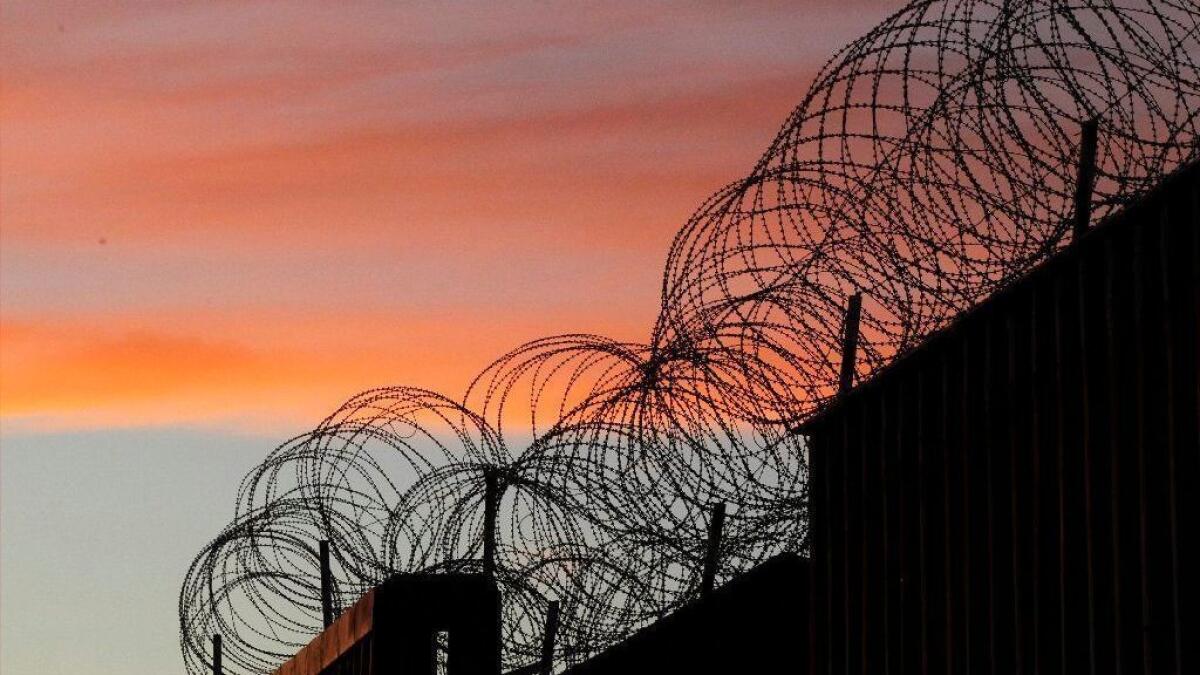Pentagon will keep troops on U.S.-Mexico border through September

- Share via
Reporting from Washington — The Pentagon has agreed to keep several thousand U.S. troops deployed on the U.S.-Mexico border until Sept. 30, again expanding a controversial mission that began last fall and already was extended once.
The troops’ role will transition from “hardening” border crossings to “mobile surveillance and detection” and putting up more concertina wire between ports of entry, according to a Pentagon statement.
Acting Defense Secretary Patrick M. Shanahan approved the Dec. 27 request from the Homeland Security Department for an eight-month extension of the current deployment, which was supposed to end this month.
Shanahan took over the Pentagon after James N. Mattis resigned in late December in protest of President Trump’s decision to withdraw U.S. troops from Syria. Trump has not nominated a permanent Defense secretary.
As of last week, about 2,350 troops were deployed to the border, with roughly 600 in Texas, 650 in Arizona and 1,100 in California, mostly at the San Ysidro port of entry, according to Michael Kucharek, a spokesman for the U.S. Northern Command.
“We need support at the border and [the Defense Department] is helping,” said Katie Waldman, a Homeland Security spokeswoman.
Trump initially sent about 5,900 active-duty troops to assist the Border Patrol on the southwest border a week before the Nov. 6 midterm election. Trump argued that the troops were needed to prevent so-called caravans of migrants from Central America from entering the United States. Most of the migrants remain in Mexico.
On Oct. 29, Trump tweeted, “This is an invasion of our Country and our Military is waiting for you!”
The move prompted criticism that Trump was using the Pentagon for a partisan political agenda, not to counter a military threat, as well as concerns that the deployment could violate a federal law that prohibits troops from engaging in law enforcement on U.S. soil.
Troops on the border are authorized to use force if necessary for self-defense. They were not involved in several recent clashes when Border Patrol agents fired tear gas at rock-throwing migrants and others.
The extended deployment was announced late Monday during the partial government shutdown over Congress’ refusal to meet the president’s demands for $5.7 billion for his proposed border wall.
Tens of thousands of Border Patrol agents, Customs and Border Protection officers, Coast Guard crews and other border security personnel have gone without paychecks since the shutdown began on Dec. 22.
Trump visited a border post in Texas on Jan. 10, two days after delivering a prime time TV address about conditions on the border.
A new migrant caravan set out from Honduras on Tuesday, and Trump seized on the news to push for his wall.
“A big new Caravan is heading up to our Southern Border from Honduras… Only a Wall will work. Only a Wall, or Steel Barrier, will keep our Country safe! Stop playing political games and end the Shutdown!” he tweeted.
Military operations at the border so far have mostly consisted of installing and reinforcing barriers, providing aerial support, helping maintain vehicles, deploying technology to help detect people at night, and assisting with medical aid.
The troops have installed up to 70 miles of concertina wire along the border, Kucharek said.
In an exit interview with The Times last month, John F. Kelly, then the White House chief of staff and a retired four-star Marine general, dismissed concerns about the border being militarized.
“Generally speaking, the U.S. military doesn’t particularly like to be deployed in the U.S.,” Kelly said several days before he left the White House. But he said the military will follow orders as long as they are legal, adding, “The military wouldn’t allow itself to be used politically.”
Twitter: @mollymotoole
More to Read
Get the L.A. Times Politics newsletter
Deeply reported insights into legislation, politics and policy from Sacramento, Washington and beyond. In your inbox twice per week.
You may occasionally receive promotional content from the Los Angeles Times.










